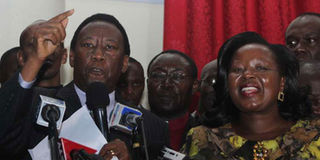Why the State must stay away from religion

Bishop Mark Kariuki flanked by other religious leaders addresses journalists at Christ is the Answer Ministries in Nairobi on January 11, 2016. All sincerely religious people believe that their belief is true, and is perhaps the only true way to ‘heaven’. PHOTO | JAMES EKWAM | NATION MEDIA GROUP
What you need to know:
- It was obvious to any disinterested observer that attempting to regulate religious belief marks the first steps towards government-sanctioned religion, a theocracy in all but name.
- As we have said before, people should be left to hold whatever religious views and beliefs they feel work for them, and the State should never make any regulations touching on the practice of religion.
When the government late last year expressed its intention to begin regulating religious practices in order to weed out “fraudulent” preachers and groups, we warned in this column that this constituted a very slippery slope.
It was obvious to any disinterested observer that attempting to regulate religious belief marks the first steps towards government-sanctioned religion, a theocracy in all but name.
What surprised some of us was the unanimity with which many religious leaders welcomed the proposed regulation, and we pointed out that they would probably come to regret this.
A few short weeks later, these same leaders are calling press conferences to dispute the published regulations, arguing that churches and religious organisations should be left to operate according to their own doctrine.
It is obvious to everyone that there are conmen who start religious groups in order to take advantage of many people’s unquestioning stance towards anything that purports to come from a ‘superior’ power.
It is also clear that there are some religious leaders who enter the service with conviction and the intention to help their followers to improve their lot in life.
Some even sincerely believe in the power of their particular brand of religion to change the world, and pursue this even at great risk to themselves.
The difficulty arises when a person outside of these systems of religious belief attempts to determine who is genuine and who is not.
All sincerely religious people believe that their belief is true, and is perhaps the only true way to ‘heaven’.
Believing otherwise is untenable because it would result in so much mental tension that the individual would have to change religions.
Arguing with such a person from a purportedly ‘objective’ point of view is a waste of time, because their convictions are not subject to reason or evidence.
Worse still, prescribing regulations on the ‘right’ and legal way of practicing religion runs afoul of most religious beliefs, since the source of these beliefs cannot be subjected to questioning.
STATE AND RELIGION
Many religions are based on ancient writings by authors claiming to have been either instructed or inspired by a ‘higher being’.
Their doctrines were received and practiced without question, and have been passed on from generation to generation to this day.
Due to the fact that it would be impossible in a free and open society for the State to identify with one religion from among the many practised by the citizens, our Constitution clearly separates the State from religion.
Political leaders cannot conceivably agree on one religious group, seeing as they represent the entire range of such groupings in the country.
In any case, the criteria for selection and election of State and public officers does not require adherence to any one religious set of beliefs.
In my view, expecting the State to police religious observances, categorising them into legal (and presumably ‘right’) and illegal (and presumably ‘wrong’) practices is impractical and only serves to create further confusion in the sector.
As we have said before, people should be left to hold whatever religious views and beliefs they feel work for them, and the State should never make any regulations touching on the practice of religion.
To deal with societal crises related to religious practices, such as fake healing claims, terrorism, and unhealthy lifestyle instructions, existing laws and regulations are more than adequate.
Atwoli is associate professor of psychiatry and dean, School of Medicine, Moi University; [email protected]





